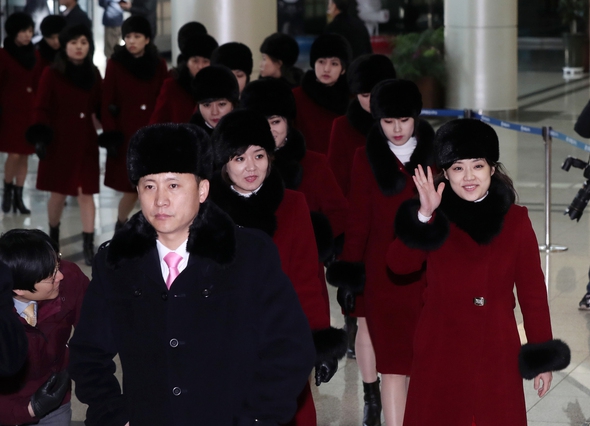 |
|
Members of the North Korean artistic performance group head for home through the inter-Korean transit office in Paju, Gyeonggi Province. The group held two special Olympic performances in Gangneung and Seoul during its visit to South Korea. (Photo Pool)
|
North Korea warns that “inter-Korean relations will stagger” if Key Resolve exercises are held following Olympics
Following North Korean leader Kim Jong-un’s proposal for a summit with South Korean President Moon Jae-in, interest is focusing on the question of resuming the South Korea-US joint military exercises. Such a summit could have an impact not only on inter-Korean relations and North Korea-US dialogue in the future but also on South Korea-US cooperation. While speaking on the phone on Jan. 4, Moon and US President Donald Trump agreed not to hold the South Korea-US joint military exercises (Key Resolve and Foal Eagle) during the Pyeongchang Winter Olympics and Paralympics, which last from Feb. 9 to Mar. 18. These yearly exercises had always begun in late February or early March. The big question is what will happen after the Pyeongchang Olympics. North Korea’s state-run Rodong Sinmun warned on Feb. 7 that if the South Korea-US joint exercises resume, “inter-Korean relations will stagger when they have just taken their first step.” The North has long been unhappy about the Key Resolve exercises, which include operations to eliminate the North Korean leadership. With the US emphasizing “maximum pressure and engagement” toward North Korea, it is unlikely to agree at present to another postponement of the exercises. The Blue House has said the plans to resume the deferred exercises in April remain unchanged – but its attitude also suggests it is considering reducing their scale or shortening their duration. “The likelihood of the exercises being postponed does not appear high,” a Blue House source said on Feb. 12. But the same source added, “If there are signs of a thaw between the North and the US, we could hold discussions with Washington on a possible reduction of the exercises’ scale or duration.” The message suggests that while Seoul is unlikely to raise the question of another postponement due to the potential negative impact on its alliance with the US, it may consider a reduction in scale depending on North Korea’s attitude. Observers are also reading into Moon’s remarks during a Feb. 9 summit with Japan, in which he protested Prime Minister Shinzo Abe’s demands to “proceed with the joint exercises as scheduled” as “interference in domestic affairs.” Another senior Blue House official said, “We’re not yet in a place where we can lend momentum to a downscaling of the exercises.” “At present, the military exercises are being held in April,” the officials stressed, while adding, “all possibilities are open in diplomacy. We can examine every possible option.” By Seong Yeon-cheol and Noh Ji-won, staff reporters Please direct questions or comments to [english@hani.co.kr]






